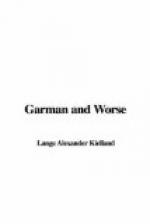The trustworthy Mr, Samuelsen did the work of three. He was a little grey shrivelled man, with a face like a dried fig. He might be forty, or he might be sixty, it was not easy to tell. In his monotonous life there had only been one single event which he particularly remembered, and that was the afternoon when he had taken his books and calculations in to Mrs. Worse, and since that time he had, with the greatest honesty, helped her to overcome her many difficulties. Mr. Samuelsen had also his own private enemies to contend against, and these consisted of nearly all the school children in the town. It had always been, and was still, a favourite amusement for the children to “Sing for Pitter Nilken.” The game was carried on in the following manner. Boys and girls all assembled, the more the merrier, generally in the dusk of the evening, and sneaked quietly down into the alley at the back of the Worses’ house, and when they got under Samuelsen’s shop-window, they began singing, to a well-known air—
“Little Pitter
Nilken,
Sitting on his chair!
He’s always growing
smaller,
The longer he sits there.”
This couplet was repeated again and again, each time in a louder tone, until the tormented man seized his iron ruler and sprang over the counter. Then off flew the crowd, screaming and shouting along the narrow lane, for there was an old tradition that the iron ruler had a rusty stain of blood on it. Samuelsen would then retire quietly to his desk. In the course of years the episode had been of constant occurrence, and he well knew that the only way of getting a little peace was to make this sally with the ruler.
No one could blame Mrs. Worse for making an idol of her son; he was all she had to care for. Although Jacob was a good son, and grew up strong and healthy, he had cost his mother many tears when he came home from school bruised and untidy after a fight. The boy had almost too much spirit, as the principal said, and when he was roused he did not mind tackling the biggest and strongest boys in the school. But he got better as time went on, and when he came home from abroad to take his place in the business, he was, and not only in his mother’s opinion, one of the best-looking and most agreeable young men in the town.
Jacob Worse took his father’s old office in the front of the house, which looked on to the market and the quay. He carried on a business partly on commission and partly on his own account. He did a good deal of trade, particularly in corn, which had hitherto been almost entirely in the hands of Garman and Worse. The old firm had established itself so securely on every side, that he seemed to meet them whichever way he turned.
Morten wished that Garman and Worse should at once use their strength, and crush their tiny rival before he had had time to become dangerous, but Consul Garman would not hear of it. He seemed to have an extraordinary liking for Worse, and even went out of his way to help him, and latterly “the rival” had become a constant Sunday guest at Sandsgaard.




